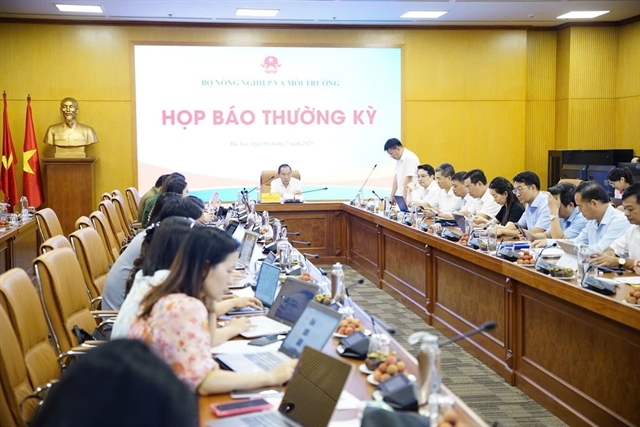 Politics & Law
Politics & Law


|
| Participants at the Ministry of Agriculture and Environment's press briefing on the ministry’s mid-year review and upcoming tasks for the second half. Photo nongnghiepmoitruong.vn |
HÀ NỘI — The Ministry of Agriculture and Environment has said it will work with the Ministry of Finance to review land use fee regulations and develop a pricing policy that reflects market conditions and balances State and public interests.
At a Thursday press briefing on the ministry’s mid-year review and upcoming tasks for the second half of 2025, Deputy Director of the General Department of Land Administration Mai Văn Phấn raised concerns about rising land prices, which are making it harder for residents to change land-use purposes.
He noted there are currently two conflicting groups with a stake in land-use fees: those whose land is reclaimed, and those converting land use who face high taxes. The core challenge, he said, is how to ensure fairness and reconcile the interests of both groups.
Before the 2024 Land Law, land prices were based on a State-issued price framework, which localities then used to formulate their own pricing tables. This often led to significant discrepancies from actual market prices, posing obstacles to public investment projects due to inadequate compensation and delays in land clearance.
Resolution 18, issued by the Party Central Committee on June 16, 2022, sets a clear direction that land pricing must closely reflect market values. The goal is to ensure that landowners receive fair compensation when their land is reclaimed, while those converting land use fulfil appropriate financial obligations.
In response to public concern — particularly in Nghệ An and several other provinces — over high land-use fees when changing land use, Phấn emphasised that current practices must comply with existing legal regulations, specifically the Government’s Decree 103.
However, the Ministry of Agriculture and Environment is collaborating with the Ministry of Finance to explore more reasonable calculation methods. These may involve adjusting collection rates based on land type and user group. For example, a lower rate could apply to those converting land for residential purposes instead of the current 100 per cent charge.
“The ultimate objective,” Phấn said, “is to design a land pricing policy that is market-based, fair and fiscally sustainable.”
He confirmed that all localities must complete and issue updated land pricing tables no later than December 31 for official implementation starting January 1, 2026.
Responding to concerns that pushing environmental incident management to commune-level authorities under administrative mergers could slow response times, the ministry assured that training and clear guidance would be provided to ensure local staff are fully capable.
Regarding potential US countervailing duties on Vietnamese goods starting July 9, the ministry said it is working with the Ministry of Industry and Trade to assess impacts on key export sectors such as timber and seafood.
Some transit goods could face tariffs ranging from 20–40 per cent. Relevant agencies are reviewing market structures to prepare appropriate responses.
On the issue involving CP Livestock JSC (CP Việt Nam), Deputy Director of the Department of Livestock Production and Animal Health Phạm Kim Đăng said the Hậu Giang Department of Agriculture and Environment (now merged into the Cần Thơ Department) had disciplined and reassigned the official responsible for improperly stamping a pig carcass at the Dững Nga slaughterhouse, which operates under contract for CP Việt Nam in Long Thạnh Commune, Phụng Hiệp District.
Đăng added that the ministry would strengthen inspection of veterinary checks and tighten control over the circulation of diseased pigs, especially in high-risk areas like Hà Nội.
The Cần Thơ City Police announced that the company did not violate food safety regulations after images showing poor quality meat circulated on social media.
On May 30, a Facebook user under the name ‘Jonny Lieu’, who claimed to work at a local food store in Sóc Trăng Province (now Cần Thơ City), posted images of substandard pork and chicken, along with allegations about product quality linked to CP Việt Nam. The post quickly went viral, drawing over 171,000 reactions and more than 156,000 shares.
In light of increasing counterfeit goods and food of unclear origins in some localities, the ministry’s Quality Management Department pledged tighter coordination with market surveillance forces to step up inspections and trace product origins.
For violations involving discarded goods, such as discounted or substandard products dumped into the environment, the Việt Nam Environmental Administration will clarify accountability and step up monitoring of distribution and retail businesses. — VNS




